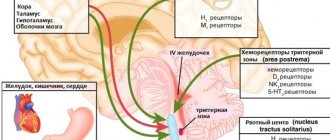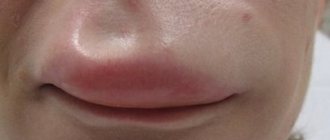Even with a single minor vomiting in a child, the parents’ task is to find out in time what caused it and take measures to prevent harmful consequences for the baby’s health.
First emergency aid for vomiting in a child - algorithm of actions
It should be borne in mind that any condition of the baby accompanied by vomiting should be assessed by a doctor. Accordingly, only a specialist can make the correct diagnosis, carry out the necessary diagnostics and prescribe treatment on time!
When a child vomits, the parents’ task is to provide the child with proper care and try to save him from further vomiting attacks.
Nausea and vomiting a lot, but no fever - what could it be?
So, the algorithm of actions for vomiting in a child:
- If vomiting is accompanied by fever, diarrhea, abdominal pain, severe lethargy of the child to the point of loss of consciousness, pale skin, cold sweat, as well as when the baby is under 1 year old or with repeated vomiting in older children, you should immediately call a doctor for house!
- The child should be placed in bed with the head turned to the side, with a towel placed in case of repeated vomiting. It is better to hold an infant in your arms in a position on its side.
- Before the doctor arrives, you should stop feeding the child , even an infant.
- During attacks of vomiting, it is better to sit the child on a chair or on your lap , tilting his body slightly forward - to avoid vomit from entering the respiratory tract.
- After an attack, the child should rinse his mouth with water , wash, and change into clean underwear.
- You should not panic in front of a child - scream, wail, cry, because this will scare the baby even more. You should act calmly and decisively, supporting the little patient with words and strokes.
- After rinsing the mouth, the child can be asked to take a few sips of water. The water should not be very cold or hot - better than room temperature. Under no circumstances should you let your child drink juices, sparkling water or sparkling mineral water, or milk.
- To drink, the child should dilute a glucose-saline solution - for example, rehydron, gastrolit, tsitroglucosalan, oralit, etc. These drugs are sold in pharmacies without a prescription and should always be kept in your home medicine cabinet. The solution must be diluted strictly according to the recipe. The child should drink 1-3 teaspoons of the solution every 10 minutes. These solutions can also be given to infants, a few drops at a time and as often as possible. If the baby falls asleep, the solution can be administered with a pipette drop by drop behind the cheek, placing the head on one side, or in a horn with a pacifier.
- If vomiting is accompanied by diarrhea , after each bowel movement you should wash the baby and change his underwear.
- The child may be hospitalized, so you should pack the necessary things for the hospital , hygiene products, spare clothes, prepare a bag and have it at hand, and get dressed.
How to stop vomiting at home
Traditional medicine will help alleviate the child’s condition and remove the gag reflex.
Herbal infusion effectively helps against vomiting in children under 2 years of age:
- Pharmaceutical camomile.
An infusion is prepared from 150 g of dried chamomile flowers. The dry mixture is poured with 200 ml of boiling water. The composition is placed in a water bath for 20 minutes. The finished product is cooled and filtered.
The child is given 1 teaspoon three times a day. Chamomile relieves inflammation, helps get rid of toxins and stop vomiting.
- Peppermint.
You can relieve nausea with peppermint. The leaves, inflorescences and stems of the plant are suitable for preparing the infusion. 100 g of mint is crushed, poured with 0.5 liters of boiling water. The product is infused for 3 hours. The child is given 2–3 spoons of water per dose.
For a one-year-old baby, the dosage is 100 g of infusion three times a day. Mint soothes the digestive system, eliminates the urge to vomit, and relieves spasms.
Children over three years old are allowed to take mint tablets, which are sold in every pharmacy chain.
An effective remedy for vomiting during travel, it helps stop the unpleasant symptom.
- Dill seeds.
The product helps to cope with gas formation and normalizes the functioning of the gastrointestinal tract. Prepare the remedy from 100 g of dill seeds and 250 ml of boiling water. The composition is infused for 1 hour and taken as tea. The product helps infants cope with colic. Relieves gagging and diarrhea stops.
pharmaceutical camomile
Peppermint
Dill seeds
For children over 2 years of age, compositions richer in components are suitable; they will help stop vomiting more effectively:
- Green tea with honey and linden blossom.
Take green tea, several linden blossoms. The composition is filled with water (approximately 85 degrees). The product is allowed to stand for 10 minutes, a spoonful of honey is added. It is given to the child as a drink. Before use, you must make sure that your baby is not allergic to honey. Helps stop vomiting and prevent pain.
- Ginger and lemon.
A mixture of lemon and ginger in 100 g is poured with boiling water and infused for 2 hours. Give the child 1 teaspoon as a support. The drug is not recommended if nausea is caused by gastritis. Gentle infusions will help stop vomiting during gastritis.
Green tea with honey and linden Lemon with ginger
It is necessary to note the following signs for yourself:
- Frequency of vomiting attacks over time, amount of vomit.
- The color and consistency of the vomit is curdled white, transparent, with foam, yellow, gray, brown or green.
- Vomiting began after a recent injury or fall of the child.
- A young child worries, cries, pulls his legs to his stomach.
- The stomach is tense, the child does not allow him to be touched.
- The child refuses to take water.
- Attacks of vomiting appear even after drinking.
- The child is lethargic and sleepy and does not want to talk.
So, what can cause a newborn baby to vomit?
- Overfeeding.
- Hyperthermia (overheating), prolonged stay in a hot, stuffy room or in the sun.
- Incorrect introduction of complementary foods - in large quantities, new products, the child is not ready for complementary feeding.
- Inadequate care of a woman for herself and feeding utensils - strong odors of perfumes and creams, bacteria on the breasts, utensils, nipples, etc. can cause vomiting of the baby.
- Poor nutrition for a nursing mother.
- Switching to another formula, as well as from breastfeeding to formula.
- Food poisoning from products of inadequate quality.
- Intoxication due to any diseases of the child - for example, ARVI, meningitis.
- Intestinal infection.
- Appendicitis, cholecystitis, cholestasis, acute enterocolitis, strangulated hernia, “acute abdomen” condition.
- Concussion due to falls or blows to the baby's head. What to do if a child hits his head?
Before the doctor arrives, parents should monitor the child, measure the temperature and prepare for the possible hospitalization of the baby.
Kinds
In medical practice, there are several types of vomiting:
- Atonic. In this case, there is a weak or moderate separation of contents from the oral cavity. More often occurs when the tone of the stomach muscles is weakened or in diseases of the esophagus.
- Spastic. This condition is called "fountain" vomiting. It occurs less frequently. When this symptom appears, parents are advised to check the child for the presence of a congenital disease of pyloric spasm.
- Abundant. Usually sudden, characterized by complete emptying of the stomach, which often occurs in jerks. It is this type that is most dangerous in childhood, as it leads to dehydration. It can be quite difficult to stop it, and the patient requires medical attention.
Based on the causes of origin, a distinction is made between organic (associated with diseases of internal organs) and psychogenic (arising as a result of excessive psychological stress) vomiting.
You might be interested in: Babycalm for newborns
In addition, it can be single or multiple, strong or moderate, bringing or not bringing relief.
Treatment of vomiting in a child - is it possible to treat vomiting in children on your own?
Parents should remember that vomiting is a serious sign of any problems in the child’s health, so it is necessary to treat the underlying diseases and pathological conditions that are manifested by this symptom. For the same reason, you cannot stop vomiting by any means, because this is a protective reaction of the body.
If vomiting is less than three times, is not accompanied by any other symptoms (diarrhea, dehydration, fever), and the child is older than one and a half years, then you should provide rest to the baby, stop feeding for a while and monitor his condition. For any, even the slightest, symptoms of deterioration, you should call a doctor or an ambulance!
If the baby is an infant, then a doctor should be called even after vomiting once.
Remember: there is no independent treatment for vomiting and there cannot be!
Causes of nausea
Vomit in our usual form is a mixture of gastric juice, food that has not yet been digested and mucus. If there is a serious inflammatory process in the body, the symptoms of which correspond to a particular disease, then characteristic blood clots, pus, bile, and in some cases even lumps of feces appear in the masses.
A person will get off with mild nausea and malaise if he overate or abused alcoholic beverages the previous evening. Afterwards, vomiting may occur, as the body’s reaction to mild intoxication. In addition, allergenic reflexes are also not alien to the body as a reaction to a particular product. Some call it a food allergy.
Infectious diseases such as typhus or scarlet fever, increased intoxication, abdominal diseases, intestinal obstruction, etc., also occur quite often. At the same time, it is curious that the psychological factor also cannot be ignored, because it can also cause trouble. There is nothing surprising here, since constant stress, especially sudden stress, often triggers this reflex. Pregnant women are familiar with toxicosis, which also consists of systematic vomiting.
A gag reflex will also be a sign of serious diseases, for example, diabetes or a type of oncology.
Vomiting may accompany:
- cerebrovascular accidents,
- thrombosis of blood vessels of internal organs,
- acute kidney diseases,
- infectious (most often intestinal) diseases,
- diseases of the visual organs,
- vestibular disorders,
- acute forms of myocardial infarction,
- drug overdose, drug incompatibility.
In any case, if the patient who feels unwell does not know about their causes and there was no overeating the day before, as well as in cases where the vomiting process is prolonged or caused by injury, you should immediately consult a doctor in order to help the patient with vomiting.
Some features of this pathological process should be highlighted. Vomiting does not necessarily have to be accompanied by nausea. If there is no nausea, this may be an unpleasant witness to the processes of inflammation in the brain. An unbearable headache is also not one of the pleasant symptoms. Perhaps it's a migraine.
What treatment will the child need due to the diseases that caused vomiting:
- Food poisoning - gastric lavage in the hospital, then detoxification and rehabilitation therapy.
- Foodborne infections, infectious diseases - antibiotic therapy, detoxification of the body.
- In acute conditions due to appendicitis, strangulated hernia, etc. - surgery.
- Concussion – bed rest and complete rest, anticonvulsant therapy, prevention of cerebral edema.
- Functional vomiting due to neuroses, stress, mental disorders - neuropsychiatric treatment and psychotherapy.
The site Colady.ru warns: self-medication can harm your child’s health and is dangerous for his life! The diagnosis should only be made by a doctor after an examination. Therefore, if vomiting occurs, be sure to consult a specialist!











